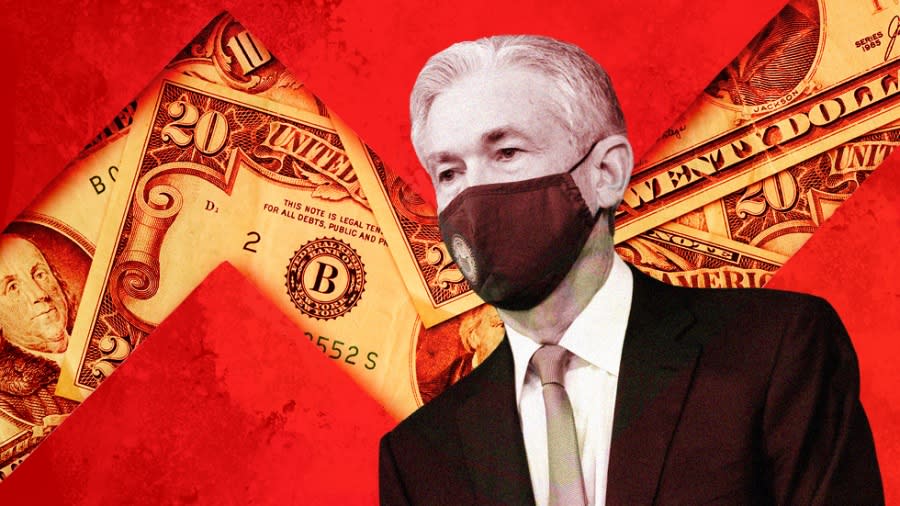On The Money — Democrats gripe over Fed’s handle on inflation

- Oops!Something went wrong.Please try again later.
High inflation is a political problem for Democrats, and they’re looking to the Fed for answers. We’ll also look at when the baby formula shortage could end and the states where housing prices are rising the fastest.
But first, the latest on monkeypox.
Welcome to On The Money, your nightly guide to everything affecting your bills, bank account and bottom line. For The Hill, we’re Sylvan Lane, Aris Folley and Karl Evers-Hillstrom. Someone forward you this newsletter? Subscribe here.
Democratic discontent brews with Federal Reserve
Discontent with the Federal Reserve is brewing among Democrats, even those who voted earlier this month to confirm Fed chairman Jerome Powell for another four-year term.
With inflation at 40-year highs and the prospect of a recession looming large over midterm elections later this year, Democrats are worried the economy could cost them their majorities.
And the feeling in the party is that if the Fed had acted quicker, Democrats might not be facing such tough headwinds.
Specifically, Democrats say the Fed started raising interests too late following the onset of the pandemic, missing an opportunity to curb the inflation that’s weighing on Democratic hopes for reelection.
The Hill’s Tobias Burns has more here.
SHORTAGE CONTINUES
Formula shortage won’t end until July, FDA chief says
The nation’s infant formula shortage likely won’t be fully resolved until late July, the head of the Food and Drug Administration (FDA) told senators Thursday.
During a Senate Health Committee hearing, FDA Commissioner Robert Califf said it will take time to get to the point when store shelves are fully stocked but that eventually there will be a surplus.
“My expectation is that within two months we should be beyond normal, and with a plethora,” Califf said. “It’s going to be gradual improvement up to probably somewhere around two months until the shelves are replete again.”
The shortage came about after an Abbott Nutrition plant was shut down in mid-February following an FDA inspection that found unsanitary conditions and multiple strains of a bacteria that can be deadly to infants.
The FDA and Abbott are operating under a legal agreement to reopen Abbott’s facility, but Califf said the company has yet to meet the FDA’s lengthy requirements and won’t be ready for the next several weeks.
Califf added that there will need to be a discussion about whether the government should create a national stockpile of formula “as a backup” to guard against future disruptions.
The Hill’s Nathaniel Weixel has more here.
GOING UP
Here are the states where housing prices are rising fastest
Home prices are up all over the country, but some states have seen particularly severe jumps.
The typical U.S. home value is currently $344,141, according to Zillow’s home value index, which only includes the middle price tier of homes. That figure marks more than a 20 percent jump in the past year.
While not technically a state, Washington, D.C, tops the list of locations that have seen the most significant spike in home values between 2002 and 2020, with prices rising 167 percent. Since 2012, they have risen 54 percent.
Hawaii, Washington, Oregon, California and Idaho have also seen huge price spikes over the last two decades.
The Hill’s Monique Beals has more here.
Read more: More than one-third of first-time homebuyers had help from their parents
REGULATING ESG
SEC proposes regulations aimed at cracking down on ESG greenwashing
The Security and Exchange Commission (SEC) proposed a new regulation to combat the practice of “greenwashing,” the misleading marketing of unsustainable investments under the ESG label.
If adopted, the measure would require funds marketing themselves as ESG-focused to disclose additional information to investors.
A related rule, also introduced Wednesday, would require any fund that labeled itself as ESG-focused to put at least 80 percent of its money into such investments.
“ESG encompasses a wide variety of investments and strategies. I think investors should be able to drill down to see what’s under the hood of these strategies,” SEC Chair Gary Gensler said in the statement.
The Hill’s Saul Elbein and Rachel Frazin have more here.
Good to Know
The Supreme Court is rebuffing an attempt from red states to block the Biden administration from using a key climate accounting metric in its decision making.
In a new order on Thursday, the high court denied the states’ request to review a ruling that enabled the Biden administration to use the climate impacts measurement. The order did not provide insight into the court’s reasoning.
Here’s what else we have our eye on:
Sens. Sherrod Brown (D-Ohio) and Bob Casey (D-Pa.) signaled their support Thursday for a federal investigation into solar panel components condemned by many of their colleagues in both parties.
That’s it for today. Thanks for reading and check out The Hill’s Finance page for the latest news and coverage. We’ll see you tomorrow.
For the latest news, weather, sports, and streaming video, head to The Hill.

